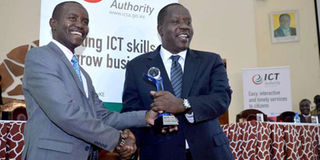Taking the digital dividends to the constituencies for prosperity

ICT Cabinet Secretary Joe Mucheru (left) and his Education counterpart Fred Matiang’i display an award during the Presidential Digital Talent Programme 2016 Quarterly meeting held at the Kenya School of Government on January 11, 2017. Mr Mucheru said Online workers worldwide earned $4 billion in 2015. PHOTO | SALATON NJAU | NATION MEDIA GROUP
What you need to know:
- The MPs will select up to four sites per constituency where the hubs will be located, while the CDF board will pay for their installation.
- The sites will have free Wi-Fi and the constituents will be able to use laptops or even smart phones to enjoy Internet services.
- The hubs will form a key component for the implementation of government efforts in forging digital inclusivity across the country.
I recently heard of the story of Abdi, a young man from Korogocho, Nairobi, who went to a network operator back in 2008 to get Internet connection for himself and his friend.
Abdi had read in the newspapers that the operator had launched a free wireless Internet connection for a youth group in Kibera, also in Nairobi.
Abdi’s timing could not have been at a worse time.
He went on the morning when the project manager had been informed that the equipment that had been set up in Kibera had been stolen the night before.
He informed Abdi that he was no longer willing to commit money to fund the project.
Abdi and his friends needed the Internet connection for a school project and he was not about to let the theft in Kibera deny him the opportunity.
“With all due respect sir,” Abdi said to the project manager, “you are dealing directly with us the ‘vijana wa mtaa (city youth)’ and not an NGO. Nobody will steal anything from us. This is going to be our source of livelihood and we shall guard it with our lives”.
After this assurance, the manager decided to give Abdi and his friends a try.
He arranged for them to get an Internet connection in a house that had been donated to the group at Korogocho.
A year later, they had grown from one computer to 20.
They had evolved from being a study group to providing their community with a myriad services.
The story of Abdi and his team is the epitome of the digital economy.
INTERNET HUBS
Stories abound of multi-billion business opportunities that had humble beginnings.
For instance, Facebook started as a Harvard University online student directory.
Airbnb was born in a California apartment when the founders used a website to hire out an inflatable mattress and offered breakfast to three lodgers to raise money to pay rent.
The Ministry of ICT together with all members of Parliament and the National Government Constituencies Development Fund Board (NG-CDF Board), are beginning the setting up of constituency innovation hubs that will provide free Internet connectivity at 1,160 sites throughout the country.
The MPs will select up to four sites per constituency where the hubs will be located, while the CDF board will pay for their installation.
The sites will have free Wi-Fi and the constituents will be able to use laptops or even smart phones to enjoy Internet services.
For those that don’t have their own devices, there will be 40 tablets at every hub.
The ministry and its partners, through the Ajira Digital initiative, will make available digital opportunities to youth in all the constituencies to help them earn a decent living.
The aim is to register 1,000 youth at every hub to form the initial team of the Ajira Digital initiative.
The young people will be introduced to various online platforms through which they can offer services to the public.
INNOVATION
They will also be shown how to set up platforms through which they can help people to access markets.
That is not all. Through the innovation hubs, one of the main barriers that online workers have will have been solved: access to the Internet.
Online workers worldwide earned $4 billion in 2015.
This is expected to grow to between $15 and $20 billion by 2020.
With the growth of this online work ecosystem, it is important that our youth are prepared to get a piece of this pie.
The hubs will expose them to the world of online work.
The hubs will form a key component for the implementation of government efforts in forging digital inclusivity across the country.
The provision of free Internet will help spur growth and innovation among our youth.
This is a great opportunity to get ‘vijana wa mtaa’ meaningful work and increase their income earning capabilities.
Through these hubs, we will see the development benefits from using the Internet grow and benefit our youth.
This will be the way to ensure that the digital dividends reach all the constituencies.
Mr Mucheru is the Cabinet Secretary, Ministry of Information, Communication and Technology





